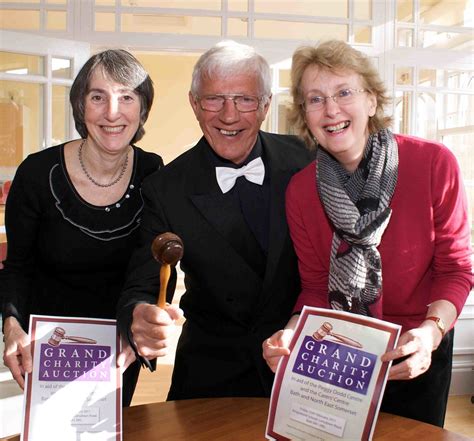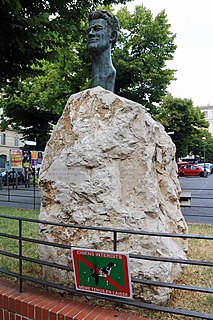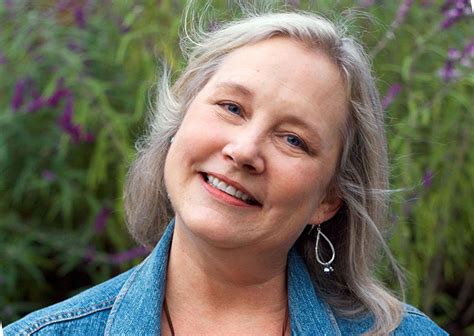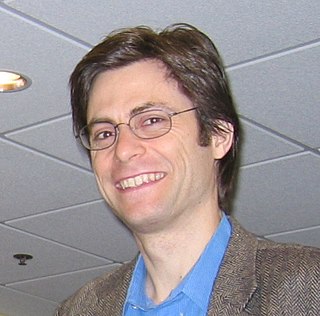A Quote by Stephen Jay Gould
Evolving life must experience a vast range of possibilities, based on environmental histories so unpredictable that no realized route - the pathway to consciousness in the form of Homo sapiens or Little Green Men, for example - can be construed as a highway to heaven, but must be viewed as a tortuous track rutted with uncountable obstacles and festooned with innumerable alternative branches. Any reasonably precise repetition of our earthly route on another planet therefore becomes wildly improbable even in a trillion cases.
Quote Topics
Alternative
Another
Any
Based
Becomes
Branches
Cases
Consciousness
Earthly
Environmental
Even
Evolving
Example
Experience
For Example
Form
Green
Heaven
Highway
Histories
Homo Sapiens
Improbable
Life
Little
Men
Must
Obstacles
Our
Pathway
Planet
Possibilities
Precise
Range
Realized
Reasonably
Repetition
Route
Sapiens
Therefore
Track
Trillion
Unpredictable
Vast
Viewed
Wildly
Related Quotes
Aberjhani's writing blows the mind and frees the psyche of any rigid assumptions about ancestral heritage. Here, our collective experience is starkly rendered. The transparency of one culture overlays another, and another, to form the daguerreotype of possibilities that is homo sapiens, interacting, almost like the elements themselves, with the created world and modified only by context and its imperatives.
Since the universe must contain millions of appropriate planets, consciousness in some form - but not with the paired eyes and limbs, and the brain built of neurons in the only example we know - may evolve frequently. But if only one origin of life in a million ever leads to consciousness, then Martian bacteria most emphatically do not imply Little Green Men.
One can see now how the idea of heaven takes hold of men's consciousness, how it gains ground even when all the props have been knocked from under it. There must be another world beside this swamp in which everything is dumped pell-mell. It's hard to imagine what it can be like, this heaven that men dream about.
The ascent of any route begins, in dreams at least, the autumn before. Our minds ring, involuntarily, with the alluring names of mountains, aiguilles, faces and ridges, Is it the name itself which is so tempting, or the picture we have of the mountain itself, or does the appeal come from our feeling of the actual process of climbing? All of us have our reasons, innumerable, personal and complex. From many points of view a climb is a challenge we must meet.
Nothing that is worth doing can be achieved in our lifetime; therefore we must be saved by hope. Nothing which is true or beautiful or good makes complete sense in any immediate context of history; therefore we must be saved by faith. Nothing we do, however virtuous, can be accomplished alone; therefore we must be saved by love. No virtuous act is quite as virtuous from the standpoint of our friend or foe as it is from our standpoint. Therefore we must be saved by the final form of love which is forgiveness.
There are, of course, inherent tendencies to repetition in music itself. Our poetry, our ballads, our songs are full of repetition; nursery rhymes and the little chants and songs we use to teach young children have choruses and refrains. We are attracted to repetition, even as adults; we want the stimulus and the reward again and again, and in music we get it. Perhaps, therefore, we should not be surprised, should not complain if the balance sometimes shifts too far and our musical sensitivity becomes a vulnerability.
This brief century of ours is arguably the most significant one in the history of our universe. We'll have the technology either to self-destruct, or [to] seed our cosmos with life. The situation is so unstable that I doubt we can dwell at this fork in the road for more than another hundred years. But if we end up going the life route instead of the death route, then in a distant future our cosmos will be teaming with life, all of which can be traced back to what we do-here and now. I don't know how we'll be thought of, but I'm sure that we won't be remembered as insignificant.




































